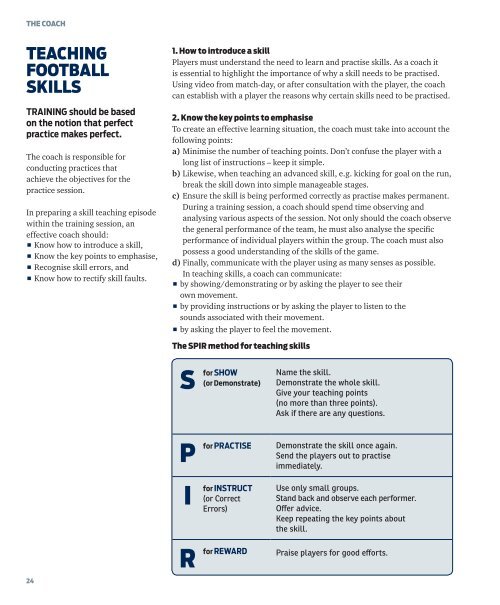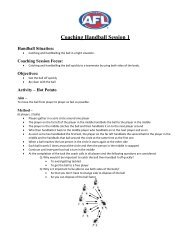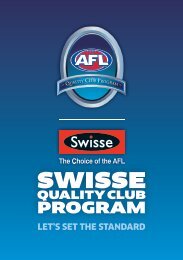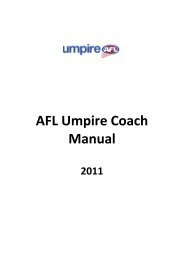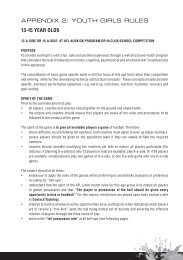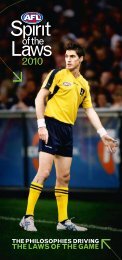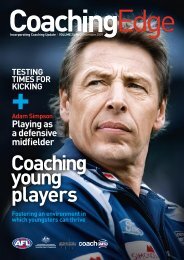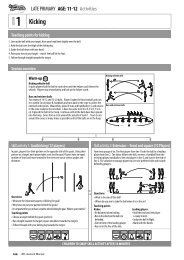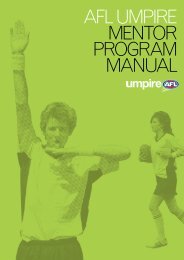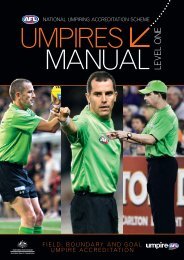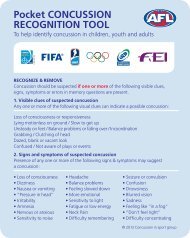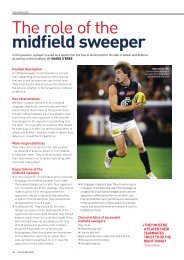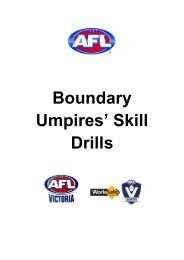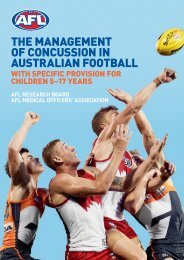AFL Coaching Manual - Western Bulldogs Football Club
AFL Coaching Manual - Western Bulldogs Football Club
AFL Coaching Manual - Western Bulldogs Football Club
You also want an ePaper? Increase the reach of your titles
YUMPU automatically turns print PDFs into web optimized ePapers that Google loves.
the coach<br />
chapter 2 – basic skills<br />
TEACHING<br />
FOOTBALL<br />
SKILLS<br />
TRAINING should be based<br />
on the notion that perfect<br />
practice makes perfect.<br />
The coach is responsible for<br />
conducting practices that<br />
achieve the objectives for the<br />
practice session.<br />
In preparing a skill teaching episode<br />
within the training session, an<br />
effective coach should:<br />
ppKnow how to introduce a skill,<br />
ppKnow the key points to emphasise,<br />
ppRecognise skill errors, and<br />
ppKnow how to rectify skill faults.<br />
1. How to introduce a skill<br />
Players must understand the need to learn and practise skills. As a coach it<br />
is essential to highlight the importance of why a skill needs to be practised.<br />
Using video from match-day, or after consultation with the player, the coach<br />
can establish with a player the reasons why certain skills need to be practised.<br />
2. Know the key points to emphasise<br />
To create an effective learning situation, the coach must take into account the<br />
following points:<br />
a) Minimise the number of teaching points. Don’t confuse the player with a<br />
long list of instructions – keep it simple.<br />
b) Likewise, when teaching an advanced skill, e.g. kicking for goal on the run,<br />
break the skill down into simple manageable stages.<br />
c) Ensure the skill is being performed correctly as practise makes permanent.<br />
During a training session, a coach should spend time observing and<br />
analysing various aspects of the session. Not only should the coach observe<br />
the general performance of the team, he must also analyse the specific<br />
performance of individual players within the group. The coach must also<br />
possess a good understanding of the skills of the game.<br />
d) Finally, communicate with the player using as many senses as possible.<br />
In teaching skills, a coach can communicate:<br />
ppby showing/demonstrating or by asking the player to see their<br />
own movement.<br />
ppby providing instructions or by asking the player to listen to the<br />
sounds associated with their movement.<br />
ppby asking the player to feel the movement.<br />
The SPIR method for teaching skills<br />
S<br />
for<br />
SHOW<br />
(or Demonstrate)<br />
Name the skill.<br />
Demonstrate the whole skill.<br />
Give your teaching points<br />
(no more than three points).<br />
Ask if there are any questions.<br />
3. Recognising skill errors<br />
An important part of skill teaching is to determine whether correction<br />
is necessary.<br />
One procedure in identifying skill error is as follows?<br />
a) Watch the player carefully over a period of time.<br />
b) Compare the player’s performance with a model of correct performance.<br />
c) Identify where there is a difference between the player’s performance<br />
and the desired performance.<br />
d) If possible, video the player to confirm these observations.<br />
e) Identify under what conditions the problem occurs.<br />
f) Measure the extent of the problem.<br />
g) Determine whether the problem needs refining that is, is the problem<br />
restricting the player’s development?<br />
h) Determine whether the problems is only a reflection of the player’s<br />
individual style.<br />
i) If there are multiple causes of the problem, decide on what error<br />
to correct first.<br />
Repetition with corrective feedback, praise for effort and encouragement<br />
enables learning to occur.<br />
4. Rectifying skill faults<br />
There are broad techniques that coaches should use to remedy problems<br />
in the performance of a skill:<br />
a) Rebuild the skill.<br />
When the performance deviates markedly from the desired model.<br />
b) Renovate the skill.<br />
When the performance only partially deviates from the desired model.<br />
Correct the component that is causing the error or the one component that<br />
is easiest to correct.<br />
24<br />
P<br />
for<br />
I<br />
for<br />
R<br />
for<br />
PRACTISE<br />
instruct<br />
(or Correct<br />
Errors)<br />
reward<br />
Demonstrate the skill once again.<br />
Send the players out to practise<br />
immediately.<br />
Use only small groups.<br />
Stand back and observe each performer.<br />
Offer advice.<br />
Keep repeating the key points about<br />
the skill.<br />
Praise players for good efforts.<br />
25


